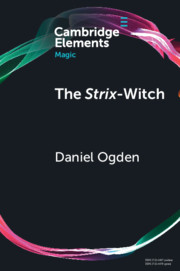6 results
Witchcraft Accusations and the Tort of Defamation in Anglophone Africa
-
- Journal:
- International Journal of Legal Information / Volume 51 / Issue 2 / Summer 2023
- Published online by Cambridge University Press:
- 03 April 2024, pp. 117-137
- Print publication:
- Summer 2023
-
- Article
-
- You have access
- Open access
- HTML
- Export citation
6 - An Untrue and Unjust Record
-
- Book:
- The Witches of St Osyth
- Published online:
- 02 December 2022
- Print publication:
- 22 December 2022, pp 216-265
-
- Chapter
- Export citation

The Strix-Witch
-
- Published online:
- 13 May 2021
- Print publication:
- 10 June 2021
-
- Element
- Export citation
Wigman's Witches: Reformism, Orientalism, Nazism
-
- Journal:
- Dance Research Journal / Volume 48 / Issue 2 / August 2016
- Published online by Cambridge University Press:
- 18 August 2016, pp. 26-43
- Print publication:
- August 2016
-
- Article
- Export citation
153 - Macbeth 1.3: “king hereafter!”
- from Part XVI - Making the Scene
-
-
- Book:
- The Cambridge Guide to the Worlds of Shakespeare
- Published online:
- 17 August 2019
- Print publication:
- 21 January 2016, pp 1150-1155
-
- Chapter
- Export citation
Part XVI - Making the Scene
-
-
- Book:
- The Cambridge Guide to the Worlds of Shakespeare
- Published online:
- 17 August 2019
- Print publication:
- 21 January 2016, pp 1119-1182
-
- Chapter
- Export citation

